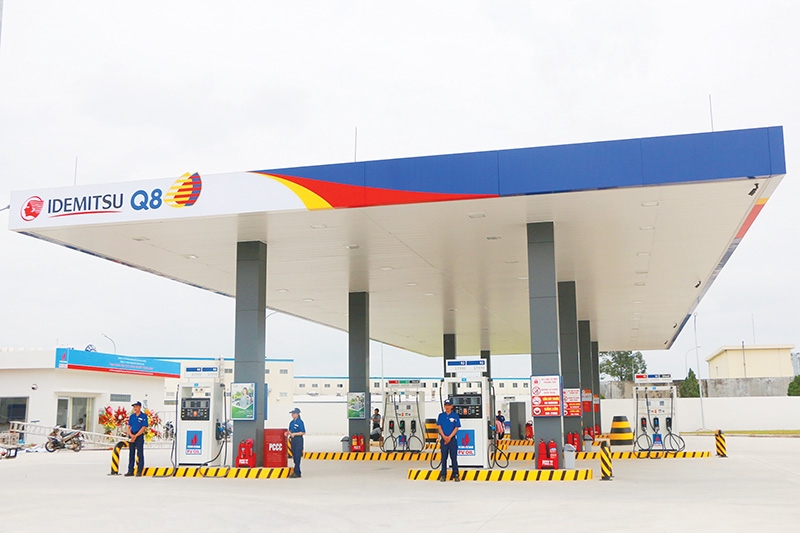 |
|
There are tricky regulatory hurdles to overcome if Vietnam wants strong overseas involvement in its petroleum industry. Photo: Le Toan
|
Vietnam has long maintained the rule that foreign-invested enterprises are not allowed to export, import, and distribute petroleum. But as the country’s market economy is gradually taking shape, the country is now aiming to create new capital flows and help the petrol and oil sector to operate more smoothly and under the market mechanism.
However, this endeavour may encounter several hurdles. Vietnam did not commit to opening its petroleum market when joining the World Trade Organization and more than 10 free trade agreements, except for enterprises investing in oil refineries to foster the distribution of Vietnam’s own products.
However, the fact that foreign investors have mostly been participating in the petroleum market through joint ventures has become an irresistible trend. For instance, Nghi Son Refinery and Petrochemical LLC (Nghi Son) has two foreign partners that hold 35.1 per cent of the company’s capital. Similarly, Vietnam’s leading petroleum distributor Petrolimex sold 8 per cent of its stake to JX Nippon Oil & Gas Exploration Corporation – a Japanese investor that became a strategic shareholder through this move since 2016.
While Vietnam so far imposed restrictions on the market economy, competition increased in the market, with 32 wholesalers trading petroleum in 2019, instead of 13 enterprises in 2012, as data from the Ministry of Industry and Trade (MoIT) showed.
Little elbow room
Vietnam’s petroleum market is now forced to compete and reduce monopolies, which may dilute the efforts of some large players to control the market, such as Petrolimex, PV Oil, and Saigon Petro. Among these, Petrolimex is leading the way in Vietnam, accounting for about 50 per cent of the domestic market share.
In the field of petroleum retail, so far only Idemitsu Q8 Co., Ltd. – the only foreign investor from Japan – holds 35 per cent of capital in Nghi Son. The first store of Idemitsu Q8 officially opened in 2017 in Hanoi and the company has now increased its presence to four stores, focusing on industrial zones and suburban areas.
It is likely that the market will become more crowded in the future, possibly with a certain competitive retail price instead of the current unified price when a new mechanism for petroleum trading is established. The MoIT has coordinated with the Ministry of Finance and other units, agencies, and business associations to develop a draft decree amending Decree No.83/2014/ND-CP from 2014 on petrol and oil trading.
According to the MoIT, the draft opens opportunities for foreign investors to participate in the market, but still relies on the principle that the state holds the power. For domestic groups, the new regulation would supplement those on compulsory reserve and control, as well as the recycling of waste in order to ensure energy security and environmental protection.
Dr. Nguyen Tri Thanh, former deputy director of the Central Institute for Economic Management, said loosening the conditions for foreign investors is only one aspect, while the petroleum sector has many problems with competition, market pressure, and other issues.
“The new draft decree will likely not fix all problems,” said Thanh, adding that he had consulted with the MoIT and confirmed that he would make a separate comment when the ministry held a public consultation.
In addition, the draft’s proposal to open the market for foreign investors to participate also encountered concerns about the influence of them on the domestic petroleum distribution system, possibly affecting national energy security.
State-managed
However Dr. Nguyen Tri Hieu, an independent analyst told VIR, “This concern is exaggerated and merely represents the fear of losing market share among domestic petroleum traders.”
According to Hieu, petroleum needs to be controlled to a certain degree while still attracting the attention of foreign investors. “Regulations on restricting foreign investors’ participation in the import and export are no longer relevant to the current economic context. Even stipulating an ownership rate of maximum 35 per cent does not help the market develop in a healthy way.”
Currently, the price of petroleum products is managed by the state as decided by the MoIT. “I don’t see a basis to allow 35 per cent foreign participation but not 49 per cent,” Hieu said about the regulation as stated in the draft. “Even if the ownership cap is increased to 49 per cent, the state would retain control, while foreign investors could see more investment opportunities in this field,” he judged.
Hieu added that modernisation of the distribution system will take place faster when Vietnam facilitates more foreign investors. Currently, consumers have to wait in long lines to pump gas at gas stations with limited service conditions. According to Hieu’s observations, many Vietnamese consumers are now interested in Idemitsu Q8’s services.
“I don’t understand why Vietnam hasn’t automated petrol filling and payment yet,” Hieu said. “Currently, Vietnam’s petroleum retail remains somewhat backward compared to global standards.”
A new mechanism could be established through the revision of a series of decrees and circulars. Hieu called this good news as many countries in the region are promoting measures to attract foreign investment, an important factor in economic recovery after the pandemic.
According to Hieu, the momentum is extremely important to prove that Vietnam is an attractive destination, “but the government needs to quickly reform institutions and administrative procedures to welcome new foreign investment flows.”
|
Deputy Prime Minister Le Van Thanh at a meeting last week asked the MoIT to carefully consider allowing foreign investors to own 35 per cent of capital in domestic petroleum retail businesses. At his conclusion, the deputy prime minister asked the ministry to base its scheme on comprehensive and objective analysis in petroleum retail. According to Thanh, it is necessary to assess what is lost in the immediate and long term when allowing foreign investors to increase their capital ratio in local businesses. |
Source: VIR

Careful consideration must be given to extending foreign ownership at petrol and oil business to 35%: Deputy PM
Deputy Prime Minister Le Van Thanh has asked the Ministry of Industry and Trade to give careful consideration to the proposal of extending the amount of foreign ownership at petrol and oil business to 35 per cent.